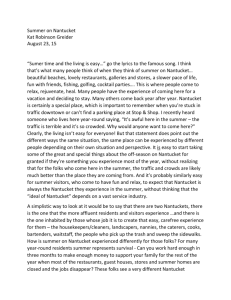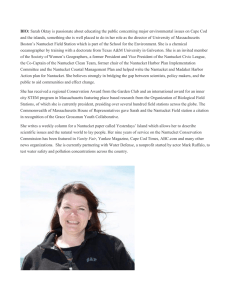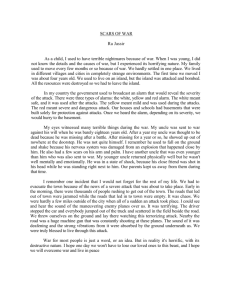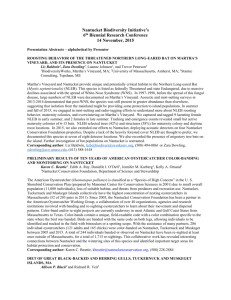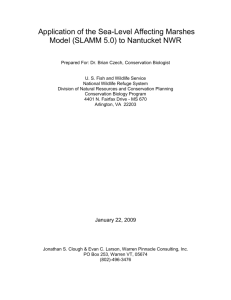Digest - Civic League Affordable Housing Forum
advertisement
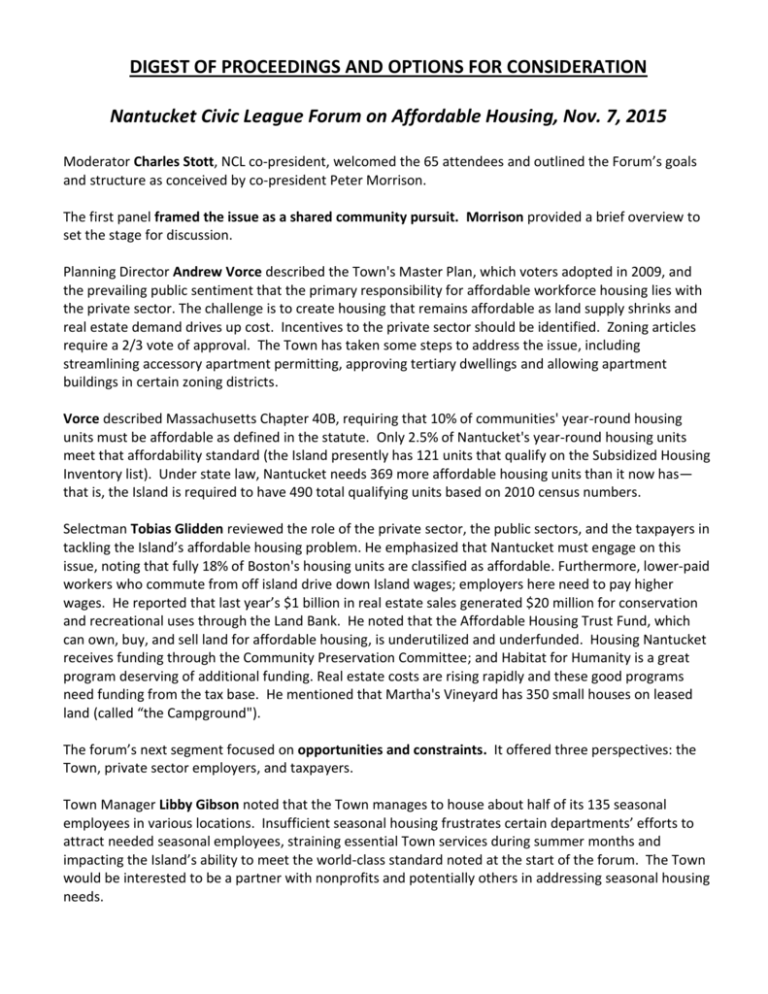
DIGEST OF PROCEEDINGS AND OPTIONS FOR CONSIDERATION Nantucket Civic League Forum on Affordable Housing, Nov. 7, 2015 Moderator Charles Stott, NCL co-president, welcomed the 65 attendees and outlined the Forum’s goals and structure as conceived by co-president Peter Morrison. The first panel framed the issue as a shared community pursuit. Morrison provided a brief overview to set the stage for discussion. Planning Director Andrew Vorce described the Town's Master Plan, which voters adopted in 2009, and the prevailing public sentiment that the primary responsibility for affordable workforce housing lies with the private sector. The challenge is to create housing that remains affordable as land supply shrinks and real estate demand drives up cost. Incentives to the private sector should be identified. Zoning articles require a 2/3 vote of approval. The Town has taken some steps to address the issue, including streamlining accessory apartment permitting, approving tertiary dwellings and allowing apartment buildings in certain zoning districts. Vorce described Massachusetts Chapter 40B, requiring that 10% of communities' year-round housing units must be affordable as defined in the statute. Only 2.5% of Nantucket's year-round housing units meet that affordability standard (the Island presently has 121 units that qualify on the Subsidized Housing Inventory list). Under state law, Nantucket needs 369 more affordable housing units than it now has— that is, the Island is required to have 490 total qualifying units based on 2010 census numbers. Selectman Tobias Glidden reviewed the role of the private sector, the public sectors, and the taxpayers in tackling the Island’s affordable housing problem. He emphasized that Nantucket must engage on this issue, noting that fully 18% of Boston's housing units are classified as affordable. Furthermore, lower-paid workers who commute from off island drive down Island wages; employers here need to pay higher wages. He reported that last year’s $1 billion in real estate sales generated $20 million for conservation and recreational uses through the Land Bank. He noted that the Affordable Housing Trust Fund, which can own, buy, and sell land for affordable housing, is underutilized and underfunded. Housing Nantucket receives funding through the Community Preservation Committee; and Habitat for Humanity is a great program deserving of additional funding. Real estate costs are rising rapidly and these good programs need funding from the tax base. He mentioned that Martha's Vineyard has 350 small houses on leased land (called “the Campground"). The forum’s next segment focused on opportunities and constraints. It offered three perspectives: the Town, private sector employers, and taxpayers. Town Manager Libby Gibson noted that the Town manages to house about half of its 135 seasonal employees in various locations. Insufficient seasonal housing frustrates certain departments’ efforts to attract needed seasonal employees, straining essential Town services during summer months and impacting the Island’s ability to meet the world-class standard noted at the start of the forum. The Town would be interested to be a partner with nonprofits and potentially others in addressing seasonal housing needs. 2 Ron Foti, Stop & Shop’s mid-island store manager detailed how his company provides 11 houses for year-round employees and rents 16 additional houses for seasonal employees. Their growing inability to hire workers who cannot find housing on Nantucket is ominous, because it threatens to affect Stop & Shop's capacity to service its customers. Marty McGowan’s landscaping company, 'Sconset Gardener, has 50-75 employees who serve 100 properties. Rather than providing them with housing, 'Sconset Gardener compensates its employees well enough to bring affordable housing within reach. The challenge, McGowan says, is the persistent lack of available housing stock. He suggested a web-based program to match employees needing housing with landlords, and a greater emphasis on long term (ten-year) leases, whereby employers could rent units for their employees. He cited the Martha's Vineyard "campground" model, whereby small houses are leased through a lottery or other system. Cape Air’s Johann Rodriguez recounted his success locating affordable housing. It built upon an informal recruitment of extended family members, successively drawn to jobs on Nantucket via word of mouth over time. This tightly knit social unit managed collectively to negotiate a favorable three-year lease for a house to accommodate its members. The arrangement has endured over time even as one individual departs and another arrives. The key ingredient: everyone is connected to everyone else, and vacancies are filled by word of mouth. Cape Air’s Peter Morrison expanded upon this “extended social unit” concept, emphasizing its natural fit with the extended family structures that are common within Nantucket’s established ethnic and immigrant communities. He posited that a web-based "Airbnb"-type bulletin board could easily broaden word-of-mouth contact within these tightly-knit communities and connect prospective seasonal workers with available spare rooms that community members might willingly offer to persons known to them. The necessary catalyst is an informal facilitator within each community—a “Johann Rodriguez” who can trigger its capacity to increase seasonal spare-room inventory. Next, audience members commented and posed questions. John Daniels of the Maria Mitchell Association noted that the over 130 non-profits on island collectively have many employees and emphasized the need for more affordable seasonal housing. Foster Hermann stressed the importance of transportation between housing and jobs. He proposed constructing four buildings adjacent to the Public Safety Facility complex, each housing 48 employees charged $200/week for a double room plus shared bath, to be leased by the Town for 20 years, and owned by the Town thereafter. Selectman Rick Atherton emphasized that employee housing is a private sector issue, as exemplified by such employers as Nantucket Island Resorts and Stop & Shop. The Town's responsibility is limited to providing housing as needed for its employees, and also land for affordable housing. He pointed out that the land for Housing Nantucket, Habitat, the Housing Authority, Sherburne Commons and Our Island Home has all been contributed by the Town’s taxpayers. Taxpayers must prioritize numerous competing interests--affordable housing, sewer expansion, Our Island Home, and a new fire station. The final panel focused in on the forum’s immediate objective: to identify potential solutions that could be pilot-tested in the spring of 2016. Stephen Maury proposed broadening the use of zoning changes to expand available year-round rentals and ownership--for example, by increasing the number of bedrooms permitted in certain 3 zones. He noted a disturbing trend for owners to rent homes only for the lucrative summer months rather than year-round. Henry Sanford proposed using tax incentives to expand the affordable housing stock—for example, a tax credit linked to the Town’s affordability standard. Ground leasing has worked, and a community land trust deserves consideration. Assistant Planning Director Leslie Woodson Snell stressed the fundamental need for more housing stock and the interconnections between seasonal and year-round housing. More owners (and employers) should take advantage of permission to have garage and accessory apartments in all zoning districts and to add tertiary dwellings. Peter Morrison led a round of further discussion among panelists aimed at surfacing ideas worth pilot testing in 2016. The following points were made: Facebook: too nebulous, according to one panelist; An Airbnb model connects owners and employees; Housing Nantucket acting as a clearing house, with landlords registering available rooms or apartments on the website; Importance of facilitating seasonal workers’ connections with housing prospects well before they arrive; Establishing a dedicated site (e.g., an electronic Hub bulletin board) maintained by a part-time staff person, sponsored and supported collectively by the Chamber of Commerce and other stakeholder associations (restaurants, landscapers, etc.). Enabling business owners to share in supporting such a collective effort, to raise $20-30,000 for a part-time employee to maintain the website and facilitate the matching process; inviting landlords to pay a fee for the service, with a registration fee paid by employees; having the part-time staff vet prospective tenants. Adopting zoning changes to allow building of a dorm-like structure; increasing the cap from 8 bedrooms per structure; establishing a dormitory overlay district; allowing greater use of the neighborhood employee housing variance; incentivizing professional landlords to create dorm-like structures; using real estate brokers to vet tenants Morrison noted the emerging outline of a possible consensus: An organization like Housing Nantucket (or some other one), receiving a modest immediate infusion of resources, could launch a limited “proof of concept” pilot-test program to link renters and owners. Owners would submit information on a website; prospective tenants would submit an application; the organization itself would screen references, perform background checks, and otherwise vet tenants. Owners and employees each would pay a modest service charge. Executing a pilot test, Morrison noted, would necessitate an immediate source of seed money for staffing and logistics. The payoff to the sponsor(s) would be a “proof of concept” by 2016, and establishment of a largely self-supporting private sector enterprise by spring 2017 or a public-private enterprise to put before Annual Town Meeting in 2017. Audience members commented. Peter Hoey of Egan Maritime Institute observed that land is expensive and half of the island is in conservation. He called for an institutional solution, doubting that any Airbnb 4 model can fix the problem. He proposed instead creation of a housing agency and the donation of 1% of the island's conservation land for the construction of housing. He said that a precedent has been set by the Land Bank, which donated land for a ballpark. He added that the Land Bank receives $20 million per year and the land acquisitions drive real estate prices up. He proposed rethinking the mission of the Land Bank and redirecting a portion of its income to housing. Kate Hamilton-Pardee cited the Woods Hole Oceanographic Institute’ website that lists available housing. She recommended forming a task force of the Chamber of Commerce, real estate agents, the Town's Planning Department, and others to establish a clearinghouse. Tom Rafter favored the clearinghouse idea, but noted a real need for more housing stock. He suggested pursuing tax incentives to encourage year-round rentals. Jose Trillos argued for the creation of a real estate trust, a private enterprise open to any investor and comparable to investing in municipal bonds. Mr. Trillos inquired if the Affordable Housing Trust Fund could be this vehicle. Andrew Vorce addressed the seven-member Affordable Housing Trust Fund, noting it has only recently been reconstituted. In essence, it administers properties donated by the Town; it has no recurring or reliable source of funding. The trust (which has no staff) can hold, buy, lease or sell land. It can accept public and private contributions. The transfers of some money from real estate sales could be considered as a source of funding, as the trust has liquid assets of only $100,000. By comparison, the Aspen, Colorado trust is funded by the taxpayers and has 14 staff. Rich Turer, a CPC member, said that the CPC could consider funding for Housing Nantucket (or some other organization) for the purposes described earlier. He favors relying on the private sector to solve the yearround housing problem but is less certain it can solve the seasonal housing crisis. He believes that Nantucket deserves better than dorm-like structures. Lee Saperstein offered the idea of building residence halls to house seasonal workers, analogous to how universities house attendees at conferences and offer elder hostels housing during the summer. Nantucket residence halls configured as clusters of bedrooms around living areas could easily be repurposed to house visitors during the shoulder seasons and attendees at special events, such as the Christmas Stroll and Daffodil Weekend. Income derived from residence halls could partially retire the municipal bonds for funding their construction. Planning Board Chair Barry Rector asked rhetorically about the Town’s political fortitude and expressed the hope that we would re-engage at the November 9 Special Town Meeting. He urged Nantucket to move forward and suggested that a grant application be made to the CPC for next year to fund the Airbnb model. He concluded by noting that less than 3% of land that could be developed is available. Moderator Charles Stott concluded by thanking the panelists and audience for their active participation. Respectfully submitted: Charles Stott, Co-President. Finalized: November 12, 2015 .

